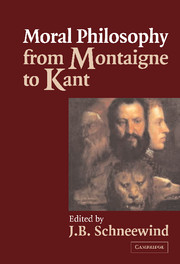Book contents
- Frontmatter
- Contents
- Preface
- Acknowledgments
- Foreword to the One-Volume Reprint
- Introduction
- PROLEGOMENA: SOME QUESTIONS RAISED
- PART I REWORKING NATURAL LAW
- PART II INTELLECT AND MORALITY
- Guillaume Du Vair
- René Descartes
- Benedict de Spinoza
- Nicholas Malebranche
- Ralph Cudworth
- Samuel Clarke
- Gottfried Wilhelm Leibniz
- Christian Wolff
- PART III EPICUREANS AND EGOISTS
- PART IV AUTONOMY AND RESPONSIBILITY
- Supplemental Bibliography
Benedict de Spinoza
Published online by Cambridge University Press: 05 June 2012
- Frontmatter
- Contents
- Preface
- Acknowledgments
- Foreword to the One-Volume Reprint
- Introduction
- PROLEGOMENA: SOME QUESTIONS RAISED
- PART I REWORKING NATURAL LAW
- PART II INTELLECT AND MORALITY
- Guillaume Du Vair
- René Descartes
- Benedict de Spinoza
- Nicholas Malebranche
- Ralph Cudworth
- Samuel Clarke
- Gottfried Wilhelm Leibniz
- Christian Wolff
- PART III EPICUREANS AND EGOISTS
- PART IV AUTONOMY AND RESPONSIBILITY
- Supplemental Bibliography
Summary
Introduction
Spinoza was born in Amsterdam in 1632, a descendant of Portuguese Jews who had fled persecution. (“Benedict” was the conventional Latin equivalent of his given name, Baruch.) Spinoza received a traditional Hebrew education and learned several modern languages. As he grew up, he found it more and more difficult to reconcile the Bible with the new sciences. His skepticism increased, and as he would not keep it to himself, he was excommunicated and thus cut off from the Jewish community. Determined to be independent, he learned the highly skilled craft of grinding lenses for the optical instruments that scientists needed, and he maintained himself by this work. Spinoza lived in Amsterdam until 1660 and then moved to a quiet village close to Leyden, where he wrote his first book, the Short Treatise on the Improvement of the Understanding, which was not published until more than a century later. He also wrote an exposition of Descartes's philosophy, presenting it in geometrical order, and began work on what eventually became his masterpiece, the Ethics. Spinoza's account of Descartes was published in 1663 under his name, with a preface explaining that he did not accept all of Descartes's views.
Spinoza let some of his own views be known in correspondence with friends and with scientists with whom he worked, and gradually he acquired a wide reputation as an important philosopher. Leibniz corresponded with him and even came to the Netherlands to talk with him.
- Type
- Chapter
- Information
- Moral Philosophy from Montaigne to Kant , pp. 237 - 255Publisher: Cambridge University PressPrint publication year: 2002

